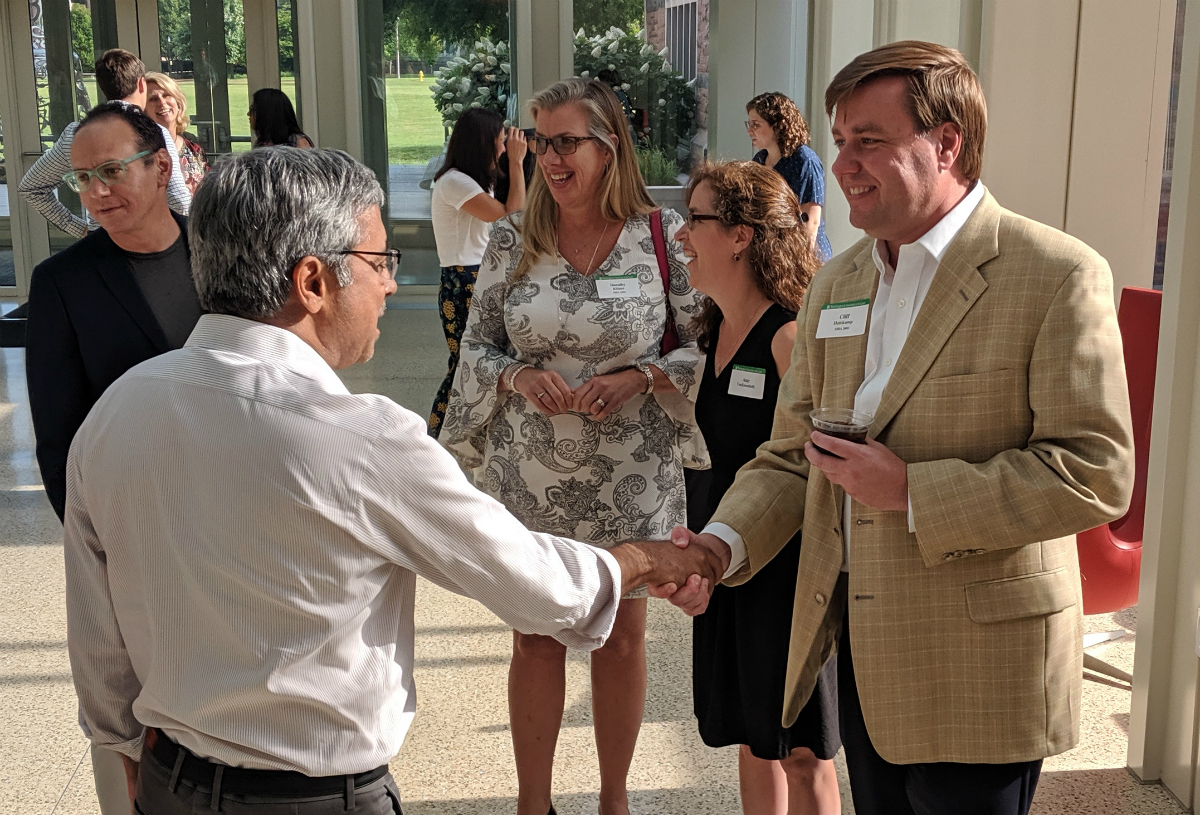Holekamp ‘put everything into the job’ at WashU Olin
- June 6, 2019
- By Kurt Greenbaum
- 4 minute read

I didn’t want to be the guy who is here in body, but not in spirit. I wanted to leave knowing that I put everything into my job here every day.
—Cliff Holekamp
Since starting work on his MBA at WashU Olin in 1999, Cliff Holekamp’s career has been deeply entwined with the campus.
Now, after he launched a startup as a student, earned that MBA in 2001, joined the faculty in 2008, taught entrepreneurship for nearly 12 years, started 14 courses in the discipline and helped more than 200 students launch their own startups, Holekamp says it’s time to disentangle himself from Olin.
Holekamp is retiring from his teaching post effective June 30 to work full-time at Cultivation Capital, the St. Louis-based venture capital firm he cofounded. Work there, he says, has become too consuming to fully focus on both that and his teaching responsibilities.
“I didn’t want to be the guy who is here in body, but not in spirit,” Holekamp said from his office in Simon Hall. “I wanted to leave knowing that I put everything into my job here every day.”
The news sparked an outpouring of reaction from former students, who praised Holekamp’s passion for their ideas and the way he urged them to test themselves.
“In him, I have found a champion—someone who believes in me and challenges me to surpass my own expectations,” said Nisa Qais, AB ’12, founder of Arya Mental Health, a San Francisco-based nonprofit. “He has been a defining highlight of my WashU experience, and I am beyond grateful for his continued presence in my life.”
Chisom Uche, AB ’10, who minored in entrepreneurship, added that “Cliff’s classes were unlike any I had taken. They tested not only creativity, but also the ability to execute within a team. Ultimately, Cliff’s classes prepared leaders for the real world.”
Getting real
Holekamp dove into “the real world” in the midst of his own MBA education when he founded a startup called Foot Healers, a one-stop shop for podiatric care. He later sold the business, though he remains connected as an adviser.
At the time, Olin Professor Bart Hamilton was teaching entrepreneurship part-time when the school offered only two courses—an introductory class and the Hatchery, designed as a launchpad for student startups. Hamilton brought on Holekamp as an adjunct to take on the intro course. He took on the Hatchery course when the instructor took ill.
Soon, former Dean Mahendra Gupta asked Holekamp to join the faculty full-time as Olin’s first dedicated entrepreneurship professor. He never looked back.
He codeveloped the entrepreneurship minor at WashU, pioneered off-campus courses with St. Louis’s Cortex and T-Rex incubators, advised senior campus leaders on entrepreneurship education, participated in searches for the Skandalaris Center’s director and the Olin dean (leading to Mark Taylor’s appointment) and a long list of other accomplishments.
“Cliff has made significant contributions to Olin,” Dean Taylor said in a tribute at Holekamp’s retirement reception. “Cultivation Capital’s gain is our great loss.”
“The school has been amazing in giving me the autonomy to build the entrepreneurship program and the freedom to collaborate with the other WashU schools and the community,” Holekamp said. “They saw the value of entrepreneurship for our students and for the strategy of the school.”
What’s endured, what’s changed
Reflecting on changes at the business school since he started, Holekamp still appreciates the intimate class sizes and personal relationship faculty members cultivate with students. At the same time, he’s thrilled at the expansion of courses, the early efforts to integrate entrepreneurship in the curriculum and the immersion of global experiences in courses and practicum projects. That’s an innovation he credits to the model pioneered in the weeklong venture consulting in Budapest course he launched.
“Getting entrepreneurship adopted as one of the four strategic pillars of the school is the capstone of my work at Olin,” Holekamp said. “We have worked to add the courses and programs needed to raise our entrepreneurship program from unranked to seventh in the country. The next phase will be to integrate entrepreneurship and innovation perspectives throughout the entire curriculum.”
Student reactions
Cliff is a champion for his students and an ambassador for the road less traveled. While many of my classmates were pursuing more traditional post-MBA jobs, through Cliff’s guidance I was able to learn about career paths in the startup community.
—Elise Hoffman, AB 2011, MBA 2016, principal at Cultivation Capital
He has always been direct, unambiguous and insightful when providing guidance or critique. I’ve worked with him for about five years at Cultivation Capital and Wash U (as a student and then employee) and his thoughts and opinions are always interesting to hear as they are very well formulated and succinct.
—Matt Plummer, MBA ’18, principal, The Yield Lab
Cliff is like the ultimate matchmaker to connect people and talent in the WashU and STL startup space. As I was trying to grow a nonprofit, he helped me access resources I didn’t even realize existed.
—Elise Hastings, MBA ’19, former managing director of Givable, transitioning after a move to Denver
Professor Clifford Holekamp is by far one of the most positive and powerful influence in my development as a young entrepreneur. No other professor has ever devoted such critical attention to my academic development, working with me to fine-tune my projects and offering feedback in ways that allowed me to mature.
—Hannah Perl, BSBA ’17, account manager at Invisibly, a startup with Jim McKelvey
Pictured above: At a farewell reception in his honor, Cliff Holekamp greets Mahendra Gupta, the former Olin dean who hired him as the first full-time entrepreneurship professor for the business school.
Media inquiries
For assistance with media inquiries and to find faculty experts, please contact Washington University Marketing & Communications.
Monday–Friday, 8:30 to 5 p.m.
Sara Savat
Senior News Director, Business and Social Sciences
